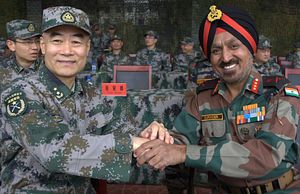On October 12, the Chinese People’s Liberation Army (PLA) and Indian Army (IA) began a joint counter-terrorism exercise, codenamed Hand-in-Hand 2015, at Kunming Military Academy in Yunnan province located in southwestern China, according to local media reports.
The Hand-in-Hand 2015 counter-terrorism drill, the fifth held since 2007, involves 175 soldiers from the Indian Army’s Naga Regiment of the Eastern Command and 144 military personnel from China’s Chengdu Military Area Command and will continue till October 22 The Hindu reports.
The aim of the exercise is “to develop joint operating capability, share useful experience in counter-terrorism operations and to promote friendly exchanges between the armies of India and China,” according to the Indian Ministry of Defense.
The Chinese state-run tabloid, Global Times, struck a similar tone saying that China and India “have agreed to enhance their military cooperation, and to boost people-to-people exchanges”.
The units involved on both sides consist of infantry and headquarter elements. “Commanders and Staff Officers of both sides will work in close coordination to receive and collate intelligence and to issue suitable operational orders to the combined field training components, who in turn will execute these orders on ground, “ the Business Standard notes. Joint exercises will include counter-insurgency operations as well as humanitarian assistance and disaster relief.
An opinion piece in the Global Times assured that “[t]here is no need to be astonished over the joint drill, for the idea of peaceful coexistence has already been deeply rooted among people from both China and India.”
The article, written by a Wang Dehua, a Chinese scholar, goes on to note “that a joint military exercise is a barometer of bilateral relationships,” noting the deepening ties between China and India. Although the scholar does admit that there have been past and recent tensions in the bilateral relationship, such as Sino-Indian border disputes as well as Chinese military presence in the Indian Ocean:
India’s defense sector is still vigilant about the Chinese military’s rapid modernization. Moreover, the growing presence of Chinese nuclear submarines and conventional submarines in the Indian Ocean is intensifying New Delhi’s anxiety.
Furthermore Wang accuses Western media of purposely misinterpreting the nature of the joint military exercise to fuel tensions between the two countries. “As a new measure of establishing mutual trust, there is no point in making a fuss over the drill. Confrontations in recent years were not created on purpose, but happened by accident. Leaders from both China and India have consensus and enough means to take divergences under control,” Wang said. He accuses Western commentators to misread these disagreements and that, in fact, relations between Beijing and New Delhi are quite good.
However, this week, India will also host the much larger Malabar 2015 naval drill, involving the United States and Japan in the Bay of Bengal. Japanese participation in the naval exercise has led to Chinese concerns, in particular after a U.S. State Department statement noted“the growing convergence” of the interests of three countries in the Indo-Pacific region, underlined by “the importance of international law and peaceful settlement of disputes; freedom of navigation and over flight; and unimpeded lawful commerce, including in the South China Sea.”
Yet, Indian officials, pointed out that New Delhi is pursuing a “multi-vectored diplomacy where IOUs are being parceled to countries on either side of the political aisle.” Thus, India continues to perform a careful balancing act between China and the United States and its allies.

































